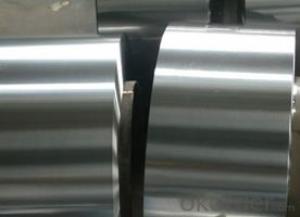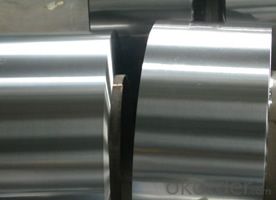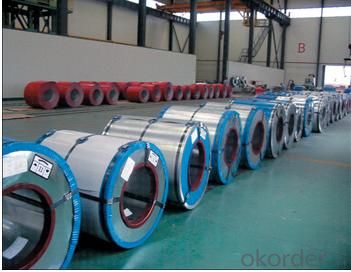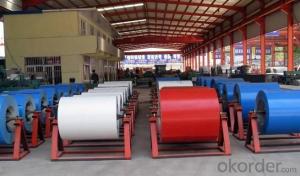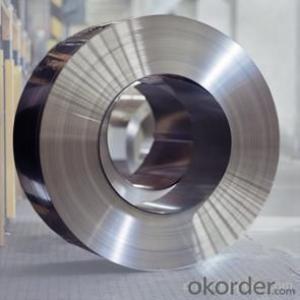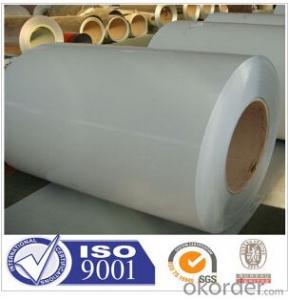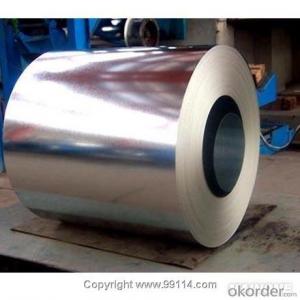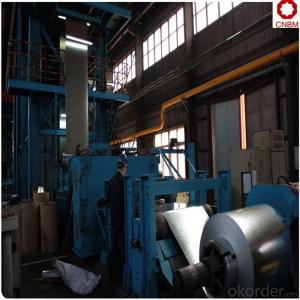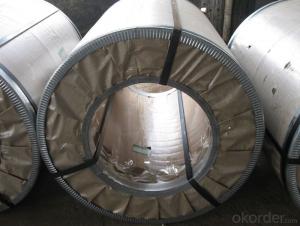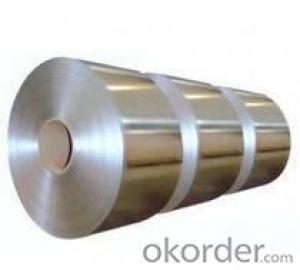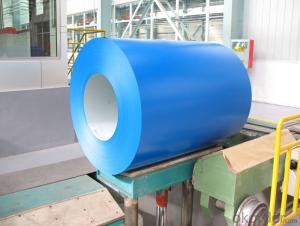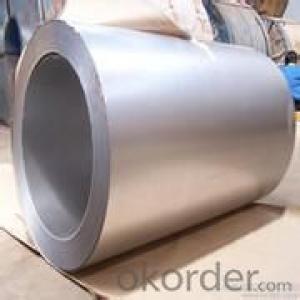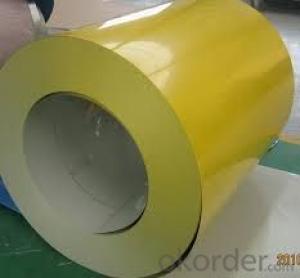Cold rolled steel coils SPCC/SPCD/SPCE/ST12-15 Q195/Q235
- Loading Port:
- Tianjin
- Payment Terms:
- TT OR LC
- Min Order Qty:
- 25 m.t.
- Supply Capability:
- 100000 m.t./month
OKorder Service Pledge
Quality Product, Order Online Tracking, Timely Delivery
OKorder Financial Service
Credit Rating, Credit Services, Credit Purchasing
You Might Also Like
Packaging & Delivery
| Packaging Detail: | seaworthy package |
| Delivery Detail: | 5 working days |
Specifications
1)international standard:Thickness 0.35mm&0.50mm
width in accordance with customers' demands
2)material:cold rolled
| Model Number | TW |
|---|---|
| Grade | Silicon Steel |
| surface color | light green |
| Brand Name | Centersky |
| Special Use | Silicon Steel |
| Type | Steel Plate |
| Application | Transformer Core |
- Q: How are steel coils transported and stored?
- Steel coils are typically transported using specialized trailers or railcars, ensuring secure and stable transportation. They are usually stored in warehouses or outdoor yards, stacked in neat rows using specialized equipment like coil racks or cradles. These storage methods help maximize space efficiency and prevent damage to the coils.
- Q: What is the average tensile strength of a steel coil?
- The average tensile strength of a steel coil can vary depending on the specific type and grade of steel being used. However, on average, steel coils tend to have a tensile strength ranging from 300 to 2,000 megapascals (MPa).
- Q: How do steel coils contribute to the HVACR equipment industry?
- Efficient heat transfer and effective functioning of HVACR systems are crucial roles played by steel coils in the HVACR equipment industry. These coils, made of high-quality steel, are integral components of air conditioners, heat pumps, refrigerators, and boilers. Facilitating heat transfer is one of the primary functions of steel coils in HVACR equipment. Designed to efficiently transfer heat between the refrigerant and the surrounding air or water, these coils utilize a large surface area and good thermal conductivity. As a result, HVACR equipment can effectively cool or heat a given space, ensuring optimal energy efficiency and reducing operating costs in residential and commercial applications. In addition to heat transfer, steel coils contribute to the overall durability and longevity of HVACR equipment. The use of corrosion-resistant steel in these coils helps prevent damage from moisture and other environmental factors. This reliability is particularly important as HVACR systems often face harsh conditions and must operate continuously to maintain comfortable indoor environments. Furthermore, steel coils offer versatility and customization options to meet specific HVACR requirements. Manufacturers can vary the size, shape, and configuration of the coils to fit available space and optimize performance. This flexibility enables efficient integration of steel coils into different HVACR equipment, ensuring they meet the specific heating and cooling needs of diverse environments. In conclusion, steel coils are indispensable in the HVACR equipment industry. They enable efficient heat transfer, enhance durability, and offer customization options, ensuring effective functioning and energy efficiency of HVACR systems. Manufacturers can provide reliable and long-lasting solutions for heating, ventilation, air conditioning, and refrigeration needs in residential and commercial settings by incorporating high-quality steel coils into their products.
- Q: How are steel coils inspected for thickness and width accuracy?
- Steel coils are inspected for thickness and width accuracy using various methods such as ultrasonic testing, laser measurement systems, and manual measurements. Ultrasonic testing involves the use of sound waves to measure the thickness of the coil, while laser measurement systems provide precise width measurements. Additionally, manual measurements are also conducted by trained inspectors who use specialized tools to ensure the accuracy of thickness and width dimensions.
- Q: I am getting a barn soon and I was debating between wood, and steel. I think steel would look nicer [painted of course] and I was wondering which is cheaper. Any extra info would be great. Thanks x
- The okorder
- Q: How are steel coils processed for galvanizing or coating?
- Steel coils are processed for galvanizing or coating through a series of steps. Firstly, the coils undergo surface preparation, which involves cleaning, degreasing, and removing any rust or mill scale. This is done using chemicals, mechanical methods, or both. Next, the coils are immersed in a zinc bath for galvanizing or passed through a coating application process for other types of coatings. This ensures a uniform and protective layer on the steel surface. Finally, the coated coils are cured or dried using heat or air, after which they are ready for further processing or shipment.
- Q: What is the standard diameter of steel coils?
- The standard diameter of steel coils can vary depending on the specific industry and application. However, in general, the standard diameter of steel coils typically ranges from 24 inches to 72 inches. This range allows for easy handling, transportation, and storage of the coils. It is important to note that different industries may have their own specific requirements for steel coil diameters based on factors such as equipment compatibility, production processes, and logistical considerations.
- Q: what do we use steel for and whyand why do we use brass for instrumentsplz help its homework and i cant find the answer anywhere : (
- By instruments do you mean musical instruments? Brass is used for musical instruments because it's strong but very malleable. It's easy to hammer and roll into sheets, or form into tubes and complex shapes. It's easy to work with using hand tools. It's also very corrosion resistant and polishes very well. It has an attractive gold-like color. It also has some effect on sound, though the shape and design of an instrument is much more important to the sound than the material that's used. Apart from musical instruments, brass is used for items that need to be both durable, easy to manufacture, and resistant to the elements. For example plumbing items like valves and screw couplings.brass is a lot easier to cut with machine tools than steel. It's also traditionally used for hardware on doors and cabinets because of it's color, low friction properties, and corrosion resistance. Brass also is toxic to bacteria, and so brass doorknobs disinfect themselves after about 9 hours. Steel is very strong and very cheap. Steel is basically iron with a small amount of carbon added which makes it much stronger. Iron is the fourth most common element in the earth's crust, after oxygen, silicon, and aluminum. Brass being a mixture (an alloy) of copper and zinc, with other metals sometimes added. Copper and zinc are the 27'th and 26'th most common elements. Therefore, it make sense that brass is much more expensive than steel. Steel is used for too many things to be listed. The use of steel technology has impacts on almost every aspect of modern life. Nearly all of the man-made objects you touch on a regular basis were made using steel tools and steel machinery.
- Q: How do steel coil manufacturers minimize waste and maximize efficiency?
- Steel coil manufacturers minimize waste and maximize efficiency by implementing various strategies such as optimizing production processes, recycling and reusing scrap materials, adopting advanced technologies for energy conservation, and implementing lean manufacturing principles to eliminate unnecessary steps and reduce downtime. They also focus on continuous improvement, employee training, and regular maintenance of equipment to ensure smooth operations and minimize waste generation.
- Q: How are steel coils used in the production of shipping containers?
- Steel coils are used in the production of shipping containers as they provide the necessary strength and durability required to withstand the demands of transportation and storage. These coils are shaped and welded into the appropriate dimensions to form the walls, roof, and floor of the container. The high tensile strength of steel ensures that the container can withstand heavy loads, impacts, and harsh weather conditions, making it an ideal choice for shipping and protecting goods.
Send your message to us
Cold rolled steel coils SPCC/SPCD/SPCE/ST12-15 Q195/Q235
- Loading Port:
- Tianjin
- Payment Terms:
- TT OR LC
- Min Order Qty:
- 25 m.t.
- Supply Capability:
- 100000 m.t./month
OKorder Service Pledge
Quality Product, Order Online Tracking, Timely Delivery
OKorder Financial Service
Credit Rating, Credit Services, Credit Purchasing
Similar products
Hot products
Hot Searches
Related keywords
